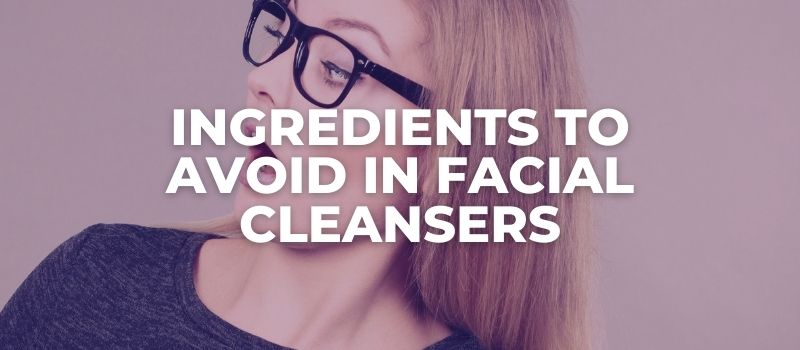Cleansing is one of the most important steps in a skincare routine.
However, knowing which ingredients to look for in a cleanser (and which to avoid) can make or break your routine.
I’ve given many suggestions regarding the best cleaners for different skin types and conditions in the past, so instead…
Today I want to share with you a short/quick list of ingredients to avoid in a facial cleanser.
While everyone is unnecessarily concerned with different chemicals used in skincare and how they affect our health, let’s pay a little bit more attention to the commonly-used ingredients that can be harmful to the skin for several different reasons.
The 3 ingredients I recommend you avoid in a cleanser (and you can see why below) are:
- Sodium Lauryl Sulfate (SLS)
- Exfoliating Acids.
- Fragrance.

Sodium Lauryl Sulfate (SLS)
Sodium Lauryl Sulfate (SLS) is one of the ingredients you will find listed in many cleaning and beauty products.
It is one of the most misunderstood ingredients out there with urban myths linking it to cancer, hormonal disruption, and whatnot.
However, science tells a different story. SLS is what’s known as a “surfactant” and this means that it has the ability to lower the surface tension between ingredients, which is why it is used in cleansing products.
Sodium Laureth Sulfate (SLES) is a surfactant with a similar chemical formula and something of a cousin (if that’s a thing) to SLS. For example, some tests found that continuous skin exposure to SLS could cause mild to moderate irritation on the skin.
But that doesn’t mean it is not safe to be used in cosmetics and personal care products. It simply means that it might not be doing your skin much of a favor, but it certainly won’t cause cancer or disrupt your hormones.
Cleansing products are designed to be rinsed off after short applications, therefore, the risks of using them are minimal, however, there are much better cleansing agents out there to choose from than SLS.
Exfoliating Acids.
Everyone and their goldfish love exfoliating acids in skincare products, and this is probably true for you too.
You have seen toners, serums, and moisturizers showcasing active ingredients that can help reduce wrinkles, brighten the skin, and prevent acne breakouts.
Basically, exfoliating acids are ingredients that cause physiologic changes in one of the skin layers.
They work by lowering the pH level of the skin and putting the skin into an acidic state. Because of this, acids work great to dissolve and digest the glue that holds dead skin cells together.
Two of the most common types of acids used in skincare products are alpha hydroxy acids and beta hydroxy acids.
Now, while acids can help treat pigmentation, texture, tone the skin, as well as reduce acne, these active ingredients are meant to stay on the skin in order to do what they are supposed to do.
And because of this, you will reap the most benefits of using exfoliating acids in leave-on products, instead of having them in cleansers, which you are going to remove from your skin three seconds after applying them.
Additionally, due to their strength in lowering the pH level of the skin, acids in cleansers can actually be mildly irritating for the skin.
Fragrance.
Extensive research on fragrance in skincare products, whether natural or synthetic, shows that this particular ingredient is a common sensitizing agent regardless of how resilient you think your skin might be.
Lots of people have a difficult time accepting the fact about fragrance being a problem for skin, so let’s explain what the concern is all about.
Fragrance in your skincare products won’t kill you or cause hormonal disruption, or something else the clean beauty industry claims in their marketing.
But the sheer truth is that it can sensitize your skin and bring out some unwanted changes years down the line including premature skin aging, wrinkles, and sagging due to the highly irritating and dehydrating properties it has.
Fragrance can also easily irritate sensitive skin as well as have an adverse effect on other ingredients that are working hard to repair your skin from the constant environmental damage.

My name is Simone and I am a certified skin specialist. I created this website to teach my readers how to take great care of their skin and I also like to occasionally share my honest opinions on skincare products I’ve tried. You can learn more about me here.
